#review script
Text
they girlbossed Sally Jackson
#pjo#pjo tv#riordanverse#sally jackson#this shall be my non-spoiler only review of the show so far#just watched the first two episodes - they were good!#i might make a post about Percy's char so far cause i am very pleasantly surprised so far with the adhd experience vibes#my compliments to the writing team for the good good disabled character rep in this script#very pleased with almost all the characters and plot so far#my only one i'm iffy on is Sally as mentioned ^ they girlbossed her#like. book sally is most defined by her kindness and perseverance. this sally is just kind of. tough. she's tough. girlboss.#which is not necessarily a bad thing? she's still a fine character she's just different#also only semi-spoiler in my review: Chris is there! Love that Chris is there#he's just there! but i am a rogue demigod enjoyer#so his presence alone is appreciated
239 notes
·
View notes
Text
Twitter is throwing a tantrum that TikTokkers are struggling to infer Annabeth's love of architecture from the show, saying that they have no literacy comprehension.
Except the TikTokkers are right lol
Annabeth lists ten facts about a building and immediately says it's a temple to Athena. She doesn't sound excited when she says it, she sounds mildly interested. She doesn't derail the group's quest because she's always wanted to visit, she brings them there because Percy's been poisoned.
To the regular viewer, it does not sound like she has an obsession with architecture. It sounds like she just knows this stuff because 1) She's an Athena child and it's a temple to Athena, 2) because the show told her she was smart in like episode two.
Annabeth doesn't rush around giddily, looking around and staring. She just kinda stands there. Where's the excitement and enthusiasm? Leah is a great actor, but these directors and writers are ass. We don't need to see Annabeth in stoic, calm dramatic silence. We need to see her be excited about her literal obsession, her literal hyperfixation!
It's also worth noting that Annabeth only talks about buildings ONCE. She doesn't say she likes architecture, she doesn't read her architecture books, we don't see her talking about the buildings they pass, we don't hear anything about Athena being the goddess of architecture, NOTHING. This is the FIRST time we've ever heard Annabeth talk about architecture and she is literally just listing facts.
Every time a new episode comes out, I become firmly more and more convinced that Twitter is watching a different show to me. Stop sucking this shows dick and actually THINK about the complaints.
#im five seconds away from busting out ao3 and writing my own damn script because what the fuck is this writing dude#i thought that i was too nice on my review of the marvels and then i watched this show and DUDEEEEEE#pjo#percy jackson#annabeth chase#pjo tv#pjo tv show#percy jackson and the olympians#pjo neg#negative#discourse#pjotv#pjotv neg#pjo tv neg#percy jackson show#swearing tw
109 notes
·
View notes
Text
Going to say this now even though I barely post here::::: Adaptations are never meant to be a 1:1 recreation of the original source material. The goal is never to recreate the exact same experience in a different format, the whole point of remaking something in a different format is to make something new.
I don’t understand why people are out here acting like the new Netflix ATLA walked onscreen, shot the original with a 44 and declared itself the new ATLA. I’m not saying you can’t criticise anything about it or any other adaptation, I just think a lot of people need to remember that an adaptation that gives you the same experience and explores the exact same themes and doesn’t elaborate on or look at things in different angles would be utterly pointless.
#honestly disappointed with how a lot of people are treating the cast of child actors#like even if you don’t like the script writing you don’t need to come after the kids#maybe the fans just have trauma from that terrible movie and don’t know how to cope with an actually decent adaptation idk#while I agree that a lot of live action remakes of animated media are unnecessary that doesn’t instantly make them bad yk#avatar the last airbender#Atla#netflix atla#netflix avatar#avatar live action#natla#natla positivity#natla review#natla critical#avatar analysis
80 notes
·
View notes
Text
hot take but the borgia apocalypse script was actually pretty good, and the characterizations were spot on. it's mindboggling how some fans hated on it solely because they expected a sunshine and rainbows ending between cesare and lucrezia. the truth is, they were never meant to be a pure fairytale couple. the most compelling aspect of their relationship is their intense toxic codependency and destructive dynamic. their obsession with each other consumed the energy, love, affection, and innocence of those around them, leading to tragic outcomes for anyone who got close to them. neil jordan stayed true to the plot with the apocalypse script, unlike what we saw in the s3 finale. despite cesare proclaiming his devotion to lucrezia and claiming to prioritize her happiness, he hurt her by killing alfonso and betraying her, alongside rodrigo, while keeping her in the dark about their plan. cesare ultimately turned out to be just like his father—his mirror image, his favorite chess piece, and a future king and pope. it was captivating to watch both rodrigo and cesare spiral into ambition and murder, becoming sociopaths. personally, i'm fascinated with the idea of cesare and lucrezia's relationship growing darker and cesare prioritizing his political gain, which terrifies lucrezia. this is the direction cesare's character would have headed if the show hadn't been canceled and if showtime had allowed neil jordan to film the script. 'world of wonders' should have been the episode that made the audience realize cesare was a manipulative, self-contradicting psychopath but alas! anyway, in the apocalypse script, he reaches the last stage of becoming a complete monster (for example, *spoilers* when he cuts off catrina's lips and poisons naples' water, killing half the city). this transformation occurs as he loses the remaining traces of humanity that were present in the first three seasons. valid criticism of the rushed nature of the script is understandable. jordan didn't have time to edit it and only released it to console devastated fans. i'm confident that his final draft would have been 100% better than what we have. in short, there's no way someone as genius as him would ruin the show he created with a disappointing ending or ooc moments. so if there's an opportunity for him to adapt it for the screen, it would be a serve as i enjoyed the overall conclusion of the story
#like bro idk what to tell you the reviews about the script had me giggle like y'all cannot be serious helpppp#wdym you need a happy ending because the show is literally made like its a tragic opera#the borgias#the borgias apocalypse#lucrezia borgia#cesare borgia#rodrigo borgia#neil jordan#borgia#text post
54 notes
·
View notes
Text
Barbie (2023) is progressive enough to say "indigenous" but not progressive enough to avoid smallpox comparisons...
Also, weirdly obsessed with the idea of reverse misogyny and ken's feelings.
#also the idea of the barbies 'liking' the patriarchy is weird and gross#because it implies that none of them were actually intelligent or independent at all#the acting is good. the costumes are good. the set design is good. the script is one of the worst ive seen in modern film.#trenchcoat reviews
115 notes
·
View notes
Text

54 notes
·
View notes
Text
This RomCom Hater Was Blown Away by What Happens Later
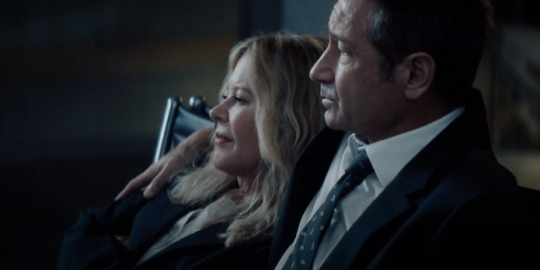
Trailer wasn't my cup of tea; but hooray for David Duchovny and Meg Ryan.
Saw the horrific reviews: in-depth, agreeing with each other. Saw the good reviews: short, didn't do much to advocate for themselves.
Read @amplifyme's praise. Intrigued. Trust her taste. Hunted the movie down.
Adored it.
Despite the constant back-and-forth carrying the scenes forward, this movie is quiet, beautifully so. In spite of nonstop scene changes, conversations, roadblocks, steps forward (and backward and forward), and-- of course-- loud intercom tunes, it doesn't distract from the heart: two mature people easily reconnecting but slowly reopening with each other. The plot holds up and follows all the way through. Excellent acting (of course.) Drama perfectly balanced by characters who act like people rather than written lines on a page. The chaotic "to be continued" resolution amazingly pulled off. The dreaded romcom three-quarter act expertly aced. What Happens Later weaves in reconciliation and grief and healing more than the potentially awkward jitters and "whoopsies!" of seeing an old flame in a (poorly written) reunion; more importantly, it shows that the love between these two people was never gone, only that it had been buried in their denial and mutual inability to put all their cards on the table. Now they do, because now they can.
Speaking of which, this film did not merit the excoriation it got. And that's saying a lot; because, truthfully, I am extremely picky about storylines and characterization and execution of those elements. This was an easy positive; and it baffles me why others rated it so badly. Willa is not annoying and she and Bill do not lack chemistry and the man over the intercom is only mildly a "character" and is not directly addressed by either until more than halfway through act (and even then Intercom Voice doesn't interfere so much as guide the characters with literal signs for them to follow if they choose.) And, no, there isn't a reason to walk out of the theatre right after the 45 min. mark, no matter how many reviews say otherwise (and I'm not going to say they were bots, buuuuuuuuuuuuut they all wrote the same thing, kind of verbatim. Meanwhile, I waited with bated breath as 5 minutes turned into 10, 20, 30, 40, 45... 46, 47, 48; and was simultaneously pleased when nothing "happened" and angered at the injustice of those reviews.) What Happens Later doesn't follow current film trends but it isn't out of style; furthermore, it doesn't feel experimental (though it is)-- flowing along seamlessly from one shot to the next without drawing attention to itself. And it doesn't try to make a statement, prove a point, or be anything other than a top-rate romcom. So, all that's left is... wrong timing? Hollywood disillusionment? Or were the crowds, like me, drawn in by the trailer, expecting a different movie; and walked out when they didn't appreciate what they were seeing?
At any rate, this is up there. Way up there. Highly recommend it to anyone.
#txf#but not#DD#What Happens Later#review#mine#first watch through#2024#I use “adore” and “beautiful” and “amazing” etc. a lot#and perhaps I need to shave down on using those words so frequently#because I REALLY want to use them here#sidenote: of the three DD movies I've seen The TV Set and this ties for number one with Return to Me in second place#(oh wait IWTB counts.... I like Mulder in that movie; but it's truly an atrociously written script sooooooo that's further down this list)
24 notes
·
View notes
Text
Disney's Wish Was...Well, You Probably Know By Now
Fire Emblem Engage, Danganronpa (the first one) and now Disney's Wish are products that I would put into the "let me write the script" category, (I'm not trying to intentionally step on anyone's toes, but there are already people making fan rewrites to at least Engage and Wish, but Wish is..well...)
All they really had to do to fix everything was to make Magnifico the main character and Asha the villain. There are definitely other rewrites of the script on YouTube alone that are so much better than mine, but the number one main complaint of the movie was the fact that Magnifico was designed to be an over the top bad guy when, really, he was one of the most reasonable characters in the film. The second half turns Magnifico evil for no reason other than to possibly appease fans who wanted a "classic villain" again.
But even characters like Maleficent (not the live action one), had motives that MADE SENSE while being wickedly evil. Magnifico for the first half of the movie was written to be sympathetic and everything he says towards Asha involving the wishes are reasonable. So when he does turn evil on a dime, there is literally no rhyme or reason for him to do so that fits with his character during the first half of the film. This actually makes Asha look more like a villain than Magnifico does, which is why I kind of wish (ha) that they went in that direction.
I don't remember a single Disney movie where a king has to stop a child/teenager from destroying a kingdom that isn't of their own flesh and blood (if there is one, I can't think of it right now.) It would be a fresh and original idea that twists the classic tale of stepchild/princess must stop the evil adult, usually an uncle, from causing mayhem in the story. It would be cool to see that turned completely on its head...but that's not what we got in the end.
So yeah, Wish is bad. Is it the WORST Disney movie ever made? Some critics I have watched say it is...I still think that the live action Lion King is the worst Disney movie of all time. Purely because all it did was copy and paste the source material, took out the best songs of the original film and made everything worse, CGI and all. At least there was an attempt to do something original with Wish...if the higher ups at Disney didn't step in and stop them. So that's my reasoning on that.
Anyways, review over.
Have a lovely night as always.
12 notes
·
View notes
Text
What upsets me the most about all the bad writing is that Qot will be written off as something that started great but ended horribly. I have no hope . I don't think anything can save it now.
But this show has given us so many really good scenes. Scenes that made me cry....that made me fall in love....that made my heart ache. BaekHong really delivered and I wish, I WISH people watch it for just that cause they're an absolutely lovely character/relationship study. Some of their scenes have really been written and executed well. It's paining me to know all of that is going to be in vain.
Soooo I hope people say, Qot was poorly written but the acting, main leads and the relationship development/arc of the main couple might just be worth the watch.
#cause this show truly has nothing else at this point#im sad#remember those scene last week where KSH and KJW acted their hearts out?#remember that scene at the palace where we all swooned and ached with them#remember that scene where she forgot her memories and was still mad at him but loved him#remember when they fell out of love#remember how they were falling in love again#remember the scenes they shot in Germany#gah I hate it here#can they get scripts reviewed by a faw fans please?#like I'm sure a lot of us could've saved this show#i miss the good old first half of this show#crying brb#queen of tears#baek hyun woo#hong hae in#kim ji won#kim soo hyun#spoilers
14 notes
·
View notes
Link
Book Review: WTHEHTYR? (script) by JonathanTaylor19
here’s the script to another video
#the heir's lair#cross-pollination#review#book review#review script#video script#gothic setting#gothic horror
0 notes
Text
Analyzing Nick Dear's Frankenstein (and why we should move on to better play adaptations)
Alrighty y'all, its the long-awaited Nick Dear Frankenstein analysis post! This post is focusing specifically on Dear's characterization of the Creature, and why it negatively affects the play overall (plus some adaption theory added in for funsies). For additional context, I am an MFA candidate studying theatre, and I did this research and the accompanying slides for a project in my graduate-level theatrical criticism class. Basically this post is the text version of that presentation, with some of the slides included, and the fluff trimmed. There is a fair bit of academic jargon in here, but I tried to make it as accessible as possible!
And with all of that out of the way, the Nick Dear Frankenstein deep dive is under the cut! (And citations at the end.)
CW: Discussions of violence and SA.
Before I get into the script itself (which if you are interested in reading it, a PDF version is easily found on google), I want to introduce a fun adaptation theory which is specific to studying Frankenstein, called "Frankenstein Complex Theory." This theory comes from Dennis R. Cutchins and Dennis R. Perry in the introduction section to "Adapting Frankenstein: The Monster's Eternal Lives in Popular Culture." (A fantastic read that I recommend to anyone if your school or local library has it in circulation.) This introduction introduces the "complex" theory, as well as some really awesome ideas that get used and referenced by all of the authors included in the book.
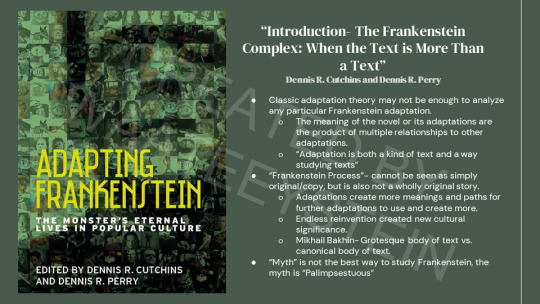
Basically Cutchins and Perry assert that traditional adaptation theory is simple not enough to properly study Frankenstein and it's innumerable adaptations. One might also assert that Frankenstein itself is an adaptation, Mary Shelley published multiple editions of her story, and one could argue that the original story is an adaptation of other stories like "Paradise Lost." Linda Hutcheon, another academic in the field of adaptation studies who also wrote a fantastic book (cited at the end), talks about this idea of "palimpsestuous Intertextuality." I want to first argue here that the original text of Frankenstein and its adaptations (the "myth" of Frankenstein) are palimpsestuous.
And when I say the "myth" of Frankenstein is "palimpsestuous," its basically just saying that the "myth" (tall green guy with bolts in his neck who is mostly non-verbal, going around killing people mostly without rhyme or reason) is the predominate cultural narrative of Frankenstein's monster, rather than how he actually is in the book. All of the cultural ideas of what Frankenstein's monster is are this giant network which interweaves with itself, references and builds off itself, and constantly creates new things from these connections. The book and it's adaptations are not in hierarchy, one is not implicitly better or more important than another, they all work together to create our cultural narrative of Frankenstein's monster. Thus, palimpsestuous Intertextuality.
But what is this "Complex" theory I mentioned earlier, and what does it have to do with Nick Dear? Well, here is a helpful diagram!
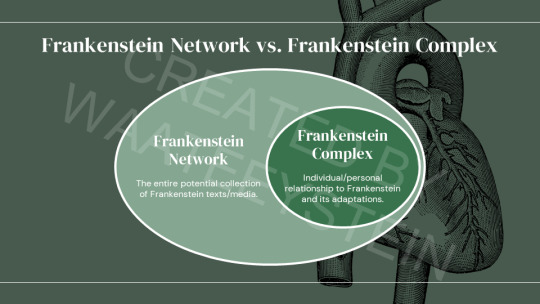
Essentially, every piece of Frankenstein media every created, including Mary Shelley's original novel, are all part of the "Frankenstein Network." The complex, however, is personal, it includes anything from that network that you have personally consumed. Some people have a wider complex than others, but nonetheless, most of us have some kind of Frankenstein Complex (if you're this far in the post I'm assuming you have one lol.) I think Cutchins and Perry really popped off when they created this theory, its a fantastic way of studying/teaching adaptation.
But onto Nick Dear. Why did I just spend so much time covering adaptation theory and teaching you all a bunch of academic jargon? Well firstly, I spent a lot of time on that research for class and I wanted to share. But secondly and more importantly, my thesis for this entire post is that Nick Dear, whose goal with his play was to create an adaptation which humanized the Creature and sticks very close to the novel, created something that was unintentionally more a product of his personal complex and the palimpsestuous "myth" of Frankenstein's monster. He wrote a play that deeply mischaracterizes the Creature, and in turn uses violence and SA for shock value rather than substance.
And maybe this is a bold claim, but I think comparing the plot of the novel (from the creature's point of view) and the plot of Dear's play is a good place to start. And for your visual reference, I created a plot diagram for both so that we can compare the two side-by-side. (Thanks Freytag lol.)
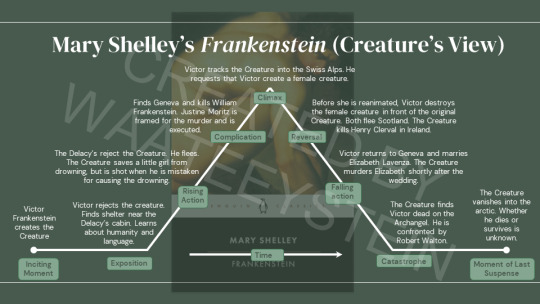
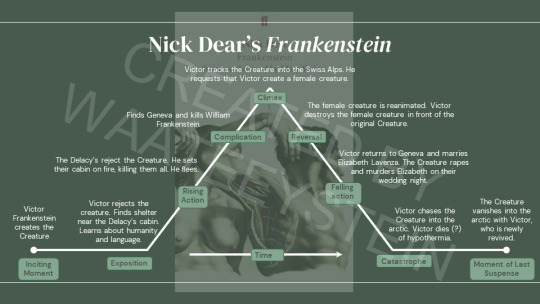
The first thing we can notice about comparing the overall plot structure is that they are indeed, very similar. And this tends to be most people's reactions to seeing this play. That compared to most other Frankenstein media, it is super faithful to the book in terms of setting and characters and hitting important plot points. And I too want to praise Dear for that. I think he was extremely smart about what characters he chose to cut or combine, and the plot points he chose to include. I also personally love that despite the cutting of Walton's character, Victor and the Creature still visit the arctic at the end of the play. Dear made so many great choices with his play, but ends up squandering it his mischaracterization of the Creature.
But how is he mischaracterizing the Creature? Well first, lets look at how Shelley characterizes him in the book, specifically in terms of violence. I argue, that anytime the Creature kills someone in the book, it is a mostly equal/proportionate reaction to the violence done against him. His first murder his killing William, and the subsequent execution of Justine after he frames her for William's murder. All of this comes after Victor's initial rejection of the Creature, and rejection by multiple villages, the DeLacey's and the young drowning girl and her father. Killing William and Justine was his first retribution after all of the rejection and violence against him, which was initiated by Victor creating him and rejecting him in the first place. And this is his only planned revenge at that point, his next move was demanding that Victor create a female creature for him, with the plan to flee and live a peaceful life in South America (whether he actually meant what he said is up to interpretation.) His next murders only come after Victor destroys the unfished female creature. This is when the Creature kills Henry and then Elizabeth. Elizabeth (and arguably Henry) are Victor's partners, and the people he most personally loves. Killing them is direct retribution for Victor destroying the female Creature, who was supposed to be (at least from the Creature's perspective) the Creature's romantic partner. All of the Creature's direct murders are direct mirrors to Victor's transgressions against the Creature. William is killed for the initial rejection and subsequent exiling from society, Henry and Elizabeth are killed for the destruction of his future romantic partner.
Dear takes a different approach in adapting these murders. In his play, the Creature's first murder is not William, but is actually the DeLacey's. After being personally tutored by Father DeLacey for a significant amount of time, the eventual and fated meeting with Felix and Agatha arrives and the creature is rejected by them. Instead of going straight to Geneva, as he does in the novel, he first sets fire to the DeLacey's cabin, killing the entire family inside. To me, this feels like the first instance of spectacle and shock over actual substance. In both Shelley's novel and Dear's play, as the creature learns about humanity and war, he clearly has a distaste for violence and killing. And because of this, I don't understand why the Creature has such an extreme reaction to the DeLacey's, especially in this version where Father DeLacey shows him so much direct kindness, and it is Felix and Agatha specifically who reject him. Why would the Creature decide to kill them all? If Dear wanted to add additional deaths, why not just kill Felix and Agatha and spare Father DeLacey because of his previous kindness? This violence, to me, feels undeserved and does not mirror the violence done against him by this family. From a staging perspective, the visual of the house burning is actually a very impressive collaboration between the set and lighting designers on the giant stage of the National Theatre. But I question why this moment needs to be here, when the rest of the play and it's staging in the premier production already has so much beauty and shock and spectacle. This is also the first moment where I find the Creature unsympathetic, because this action seems overly extreme as a response.
After this moment, the murder of William is different but not too dissimilar in tone to the novel. At it's heart, it is still the Creature's first direct revenge against Victor. After this, our next big departure from the novel is when the female creature is fully brought to life, different to the novel where she is never fully given life. Victor killing her after she has been able to briefly live is a more extreme measure on Victor's part too, which by my own argument, may warrant a more extreme reaction from the Creature. And to be absolutely clear, Victor simply kills/dismantles her, and nothing more. As for the creature's reaction, Henry is a cut character in this adaptation, so we obviously don't see his death. Instead, the Creature kills Elizabeth, but in this version, not only does the creature kill her, he also r*pes her. This is my biggest point of contention with the play. To me, the subtext in Dear's version is that the Creature views both Elizabeth and the Female Creature as some kind of property, and when his property (the female Creature) is taken away by Victor, he takes Victor's property (Elizabeth) away too. Right before her death in the play, the Creature and Elizabeth actually have a really touching conversation, and they seem to genuinely bond. And so when the Creature eventually kills her afterwards, him r*ping her comes completely out of left field. The only explanation to me, is that despite empathizing with her, the Creature ultimately still views her as Victor's property, and needed to take her away from Victor in a way that was more than just taking her life from him. And honestly, it's a really gross interpretation of these characters. And I want to be very clear that I know depiction is not endorsement, and that I also believe there is a time and a place for depicting SA on stage, but this play was not the time nor the place. The creature simply killing Elizabeth is enough to get the point across, the SA seems to have been added for pure shock value, and again, spectacle. One could argue that this action done by the creature is part of his sexual awakening, just as he learns about other aspects of humanity. But again I believe this is not justified by the text of the play, and is written for pure shock value at the expense of another character, specifically a woman. I would call this misogynistic.
And these extreme reactions from the Creature in Dear's play seem to create this hyper-masculinized version of the character and the story. And I think that is a shame considering the original story was written by a woman, and Mary Shelley did a fantastic job of writing a story where the men can exist across a spectrum of masculinity, without needing to be this stereotyped version of hypermasculinity with a desire for sexual vengeance. I mean, Victor creating the Creature is a pretty clear metaphor for motherhood/parenthood, especially considering Shelley's experience with motherhood and the loss of her children and her own mother. And not to say that a cis man isn't capable of writing an authentic adaptation of a woman's story, but here, I think Nick Dear missed the mark, especially in regards to Elizabeth's death and his depiction of Creature/masculinity.
And I don't want to boil this down to, "Nick Dear is a man and therefore his adaption is automatically bad." Because I don't think that's the case, and I think that's an unfair assumption to make. What I do think, is that despite trying to make an adaptation that strove to humanize the Creature better than most other adaptations, Dear instead created an adaptation that fell into the overly-violent monster tropes of the greater Frankenstein Network of adaptations. In essence, Dear may have unintentionally become a product of his own "complex." And unfortunately, that subconscious influence may be partially why we get this interpretation of the Creature, and the unnecessary shock factors added into the story.
So where do we go from here? Chances are, if you see a theatre company putting on a production of Frankenstein, it's probably the Nick Dear version. This was the case for me last October when I accidentally attended a production of this script at a professional theatre company back home in Florida. My hope is that one day we can move on from this script, and find a Frankenstein play adaptation that humanizes the Creature in a way that most audiences (who probably have not read the book) are unfamiliar with, while also not resorting to shock value that dehumanizes the women in the story. My homework for myself beyond this research project, is to read more Frankenstein play adaptations, and specifically ones that are not written by cis men. I think the experiences of women, trans people and disabled people (or obviously any intersection of these communities and identities) could really lend themselves to new and exciting interpretations of the script that bring broader perspectives into context. If you have any suggestions of Frankenstein plays or playwrights who have written Frankenstein plays, I would love to check them out! I also suggest giving the National Theatre world premier pro-shot of Nick Dear's Frankenstein a watch, purely just for the design of the show. Costumes, set, sound and lighting are all really spectacular, and I would love to do an analysis of that aspect of the show one day.
Obviously there was a lot about this show I didn't cover (Cumberbatch, I know), I just wanted to cover the characterization of the Creature at a textual level, because to me that is the most glaring issue with this play. Please let me know your thoughts, and thanks for reading if you got this far!
Citations (I didn't do a great job of referencing these in-text, but all of these sources are great and I highly recommend checking them out!)
Cutchins, Dennis R, and Dennis R Perry. “Introduction- The Frankenstein Complex: When the text is more than a text.” Adapting Frankenstein: The Monster’s Eternal Lives in Popular Culture, Manchester University Press, Manchester, 2018, pp. 1–19.
Dear, Nick, and Mary Wollstonecraft Shelley. Frankenstein: Based on the Novel by Mary Shelley. Faber and Faber, 2011.
Hutcheon, Linda. “Beginning to Theorize Adaptation: What? Who? Why? How? Where? When?” A Theory of Adaptation, Routledge, New York, New York, 2006, pp. 1–32.
Jones, Kelly. “Adaptations of ‘liveness’ in theatrical representations of Mary Shelley’s Frankenstein.” Adapting Frankenstein: The Monster’s Eternal Lives in Popular Culture, Manchester University Press, Manchester, 2018, pp. 316–334.
Pfeiffer, Lee. “Frankenstein: Film by Whale [1931].” Encyclopædia Britannica, Encyclopædia Britannica, inc., 24 Nov. 2023, www.britannica.com/topic/Frankenstein-film-by-Whale.
Shelley, Mary. Frankenstein; or, The Modern Prometheus. 1818.
Shelley, Mary. Frankenstein; or, The Modern Prometheus. 1831.
#please be nice in the replys!#I hope you all enjoyed this little read#I spent a day writing this instead of doing my actual time sensitive work#frankenstein#frankenstein or the modern prometheus#victor frankenstein#frankenstein monster#mary shelley#nick dear#nick dear frankenstein#script analysis#play analysis#Frankenstein play#waateeystein speaks#waateeystein reviews
13 notes
·
View notes
Text
NETFLIX: EVERYTHING NOW
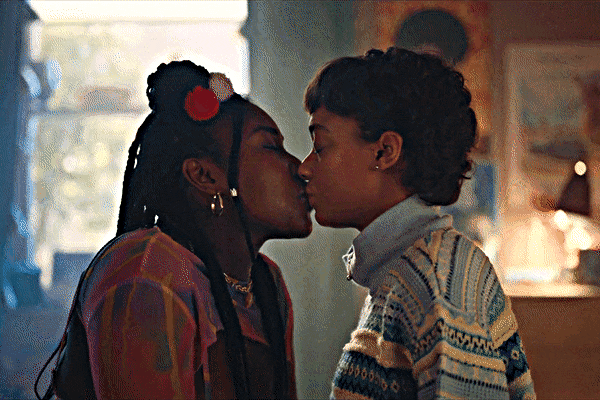
[Trigger warning: the show is centred around the main characters recovery from her ed so that’s mentioned in this post.]
I am in love with this show. I just put it in as something to watch in the background whilst I did some light work and now I’m a day behind on it because I couldn’t. Stop. Watching! (and I couldn’t see the keyboard through my tears 😭).
I don’t even know where to start- it’s been so long since I’ve seen a show and seen myself in so many of the characters and seen people I know in those character as well. In an emotional sense, a situational sense and a physical sense I literally found Cam so jarring just because he reminds me so much of two people i know.
The Script Dialogue ?
🎶 For the first time in forever 🎶 the script, written about gen z, using terms and reference of the youth, didn’t. Feel. Forced. IN ADDITION, they used reference that weren’t just globally relevant but phrases and references that are very British/Londoner gen z!
“Are you not embarrrrassssed? This is emberaasssing” - perfectly used.
I also love how there’s no pressure to announce their sexuality, everyone is just them. I’m straight, so my opinion on this means nothing in comparison but I love that. l can see why coming out is important to many and a needed process to go through but I also know many people would rather not and just love and live and from an ally’s perspective I feel like this perspective of LGBTQ+ stories are so refreshing. The kids are freely figuring themselves out with no judgement, as they should be.
The Music Choices ?
First things first because I need to point this out for people not from London who have or are looking to watch the show. These kids come from rich families- and I mean RICH. They’re not from old money wealth (like Young Royals) but they live in modern detached houses located in zone 1 more or less (that’s already worth like £1M+ range), have cars that I know for a fact definitely don’t abide by ULEZ so they defo pay extra, AND have back gardens??? Mad.
But why is this relevant? To be honest I don’t know how to word this but, the house music at the house parties, the drops of garage, when Cam was in his home and working out and they played Cench, my first thought was “Cam is defo the type of boy to know all the words to all Cench’s songs and then rap the words with vim, as if he’s from ends 😂” (translation: “ends” = “the hood”, think Top Boy).
The music choices accurately depict today UK youth and it’s not just music that fits their lives or their characters progression but instead rounds out the characters. For instance I listen to Pop Smoke despite not being able to relate to a lot of what he’s saying as I’m not from NY or live that lifestyle, but will I scream the lyrics? Yes. And that’s how I feel it is with these characters. The soundtrack was like a dip into their own spotify accounts!
AND WHEN THEY PLAYED “MY HOOD” BY RAY BLK ? I cried. That was my “bus ride to school” song in secondary school.
The Character Development ?
I haven’t routed for and been annoyed / pissed off to high heavens by / cringed for / cried for a bunch of characters in so long. I don’t want to say more about that because the show is very plot character driven and I don’t think I can explain what I mean without spoiling it.
What Got Me About The Show ?
Through the show I came to the conclusion that even when I was mad at the characters I couldn’t be completely mad because I knew where they were coming from and I knew they were struggling but still mad because it didn’t excuse or make it okay that they spread the pain. The only character that hadn’t done that I believe is Mia’s little brother (even though I myself really wanted him to give everyone what for).
As I am not someone with an ED I can’t fully relate and my two cents on this is worth nothing in comparison to those who have had the presence of an ED in their life in some way. But from my perspective I do believe that this show is very educational and brings great awareness to the mental side of it all. It’s very raw and real and unapologetically what it is.
I don’t really know how to end these things and tbf but I love this show and needed to express it especially since no one around me has watched it yet 😭.
#everything now#netflix#lgbtq+#lgbtq positivity#mental health#ed trigger warning#london#north london#gen z#gen z life#gen z humor#situationships#show review#script writing#scriptwriting#soundtrack#sound track#recovery#teenage years#sixth form#rich#RAY BLK#stormzy#bingeworthy#sobbing#Spotify
38 notes
·
View notes
Photo
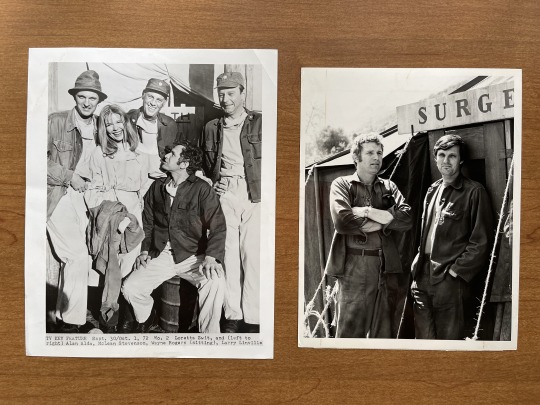

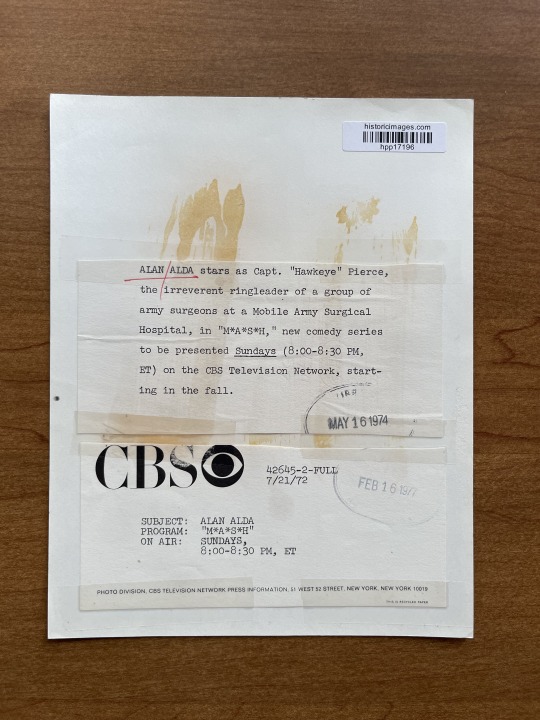
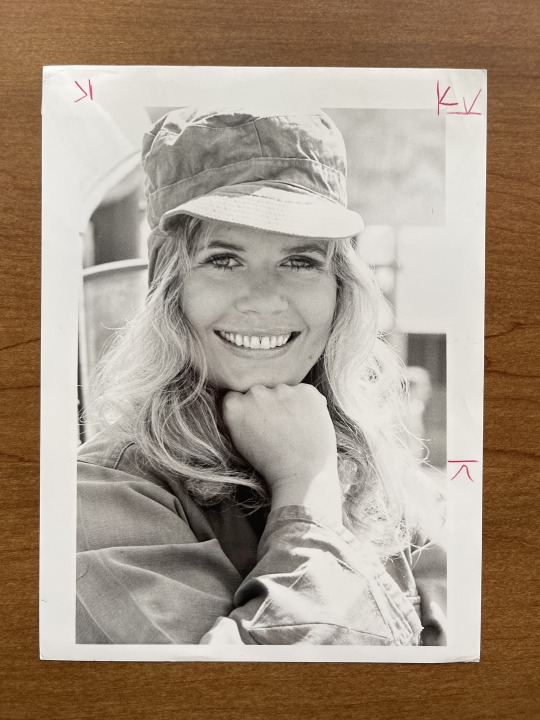

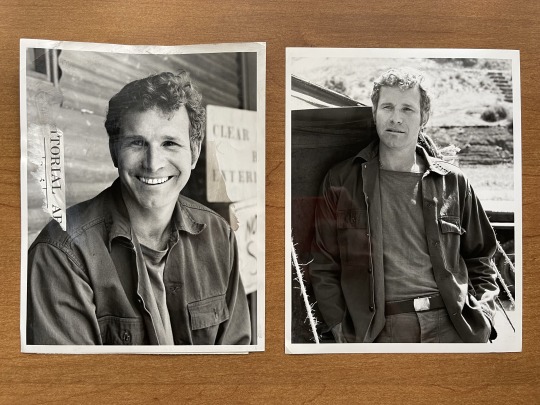
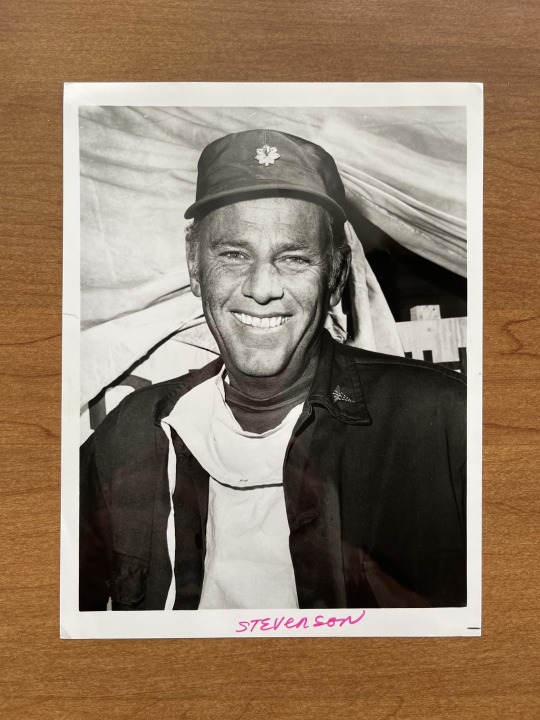

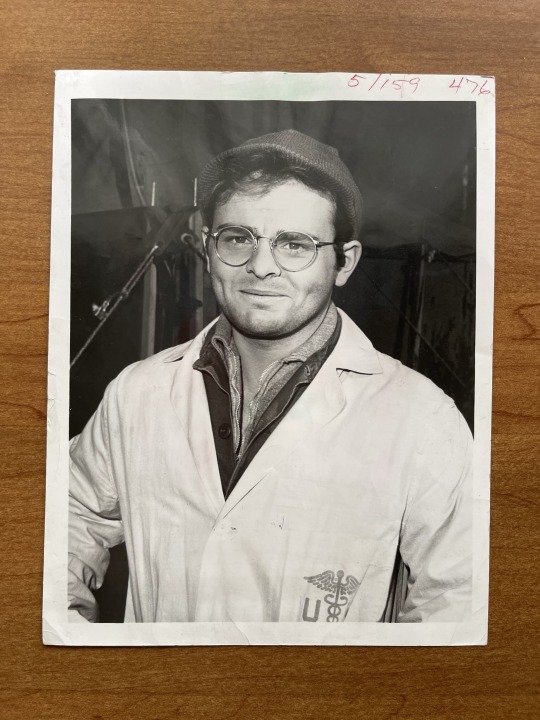
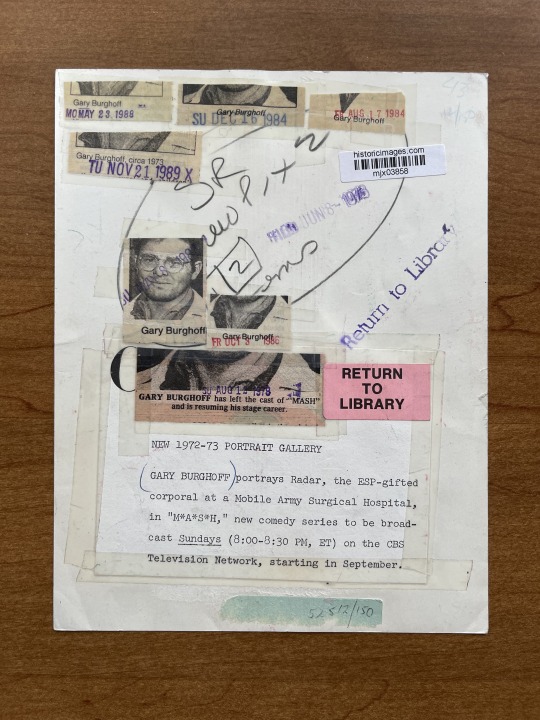
promo images of the cast from mid-1972, before season 1 aired
(source: The M*A*S*H Historian)
#(super great site btw! he reviews m*a*s*h related books and scripts and stuff)#anyway i havent seen some of these so i'm posting#mash#m*a*s*h#alan alda#loretta swit#wayne rogers#mclean stevenson#gary burghoff#larry linville#s1
272 notes
·
View notes
Text
if you’re looking for a fun activity to get you connected to your DR I highly recommend the app PhotoNote! you can make a mock instagram for your DRself and others in your dr!!
#I am spending entirely too much time on this#but it’s fun#the reviews are all full of shifters so this might be common knowledge haha#reality shifting#shifting#shiftblr#desired reality#shifting realities#scripting#scripting tips
20 notes
·
View notes
Text

I’ve been successfully peer reviewed and I’m pretty sure I now have tenure 💅
#196#rule#pokemon memes#neurodivergent shitposting#executive dysfunction#executive function? I don’t know her#story of my peer review:#had a formal diagnosis for adhd but not for ASD#went to a new psych to get back on medication#in the session we basically reviewed my original diagnosis#i left with a script for meds and with a shiny new ASD diagnosis#moral of the story: now that I have been peer reviewed and granted tenure#I can clearly armchair diagnose everyone in my life#and be 100% correct every time#this is not fallacious at all
32 notes
·
View notes
Text
slight to the moon & finding paradise spoilers AND impostor factory spoilers lolol
so i read a very old review of "to the moon" sometime ago and the author called eva a romantic at heart and neil the 'too cool, doesn't care about romance' guy, and like... what??
eva who suggested john and river's marriage was a mistake, who said "he can always find another 'river' but he will only have one brother", who declines neil's romantic advances, who is very clearly disinterested at taima's attempts to matchmake her, who in response to neil's attempts to bet on colin's problem says "it's not always about some girl, neil", who focuses on her career and family and hobbies and doesn't mind not having a romantic partner?
neil who on the other hand teared up during the memory of john and river's wedding (and tried to hide it, poorly), who disagreed with the idea of removing river because "we don't know what jhonny wants but we know what he doesn't want", who at eva's confusion with sofia's attitude towards them remarked that "well, if she is the patient's wife then she has a dying spouse", who insisted colin was romantically interested in faye, whose ideal reality has him and eva getting married????
my guy.
#it was so funny to me cause like eva is the total opposite of a romantic#NEIL is the romantic one#he does his best to keep people at a distance but my god he is the hopeless romantic i think#so hopeless that he thinks it's out of his reach#it was a review from like 2011 so sure the stuff from minisodes and finding paradise wasnt there yet#but my first examples are from to the moon and are arguably one of the most important ones#“he can always find another river but he will always have one brother” ITS RIGHT THERE IN THE SCRIPT#ALSO in the nasa headquarters#“all this over some girl. that's what you'd say neil” “...right. all this over some girl” “good to have you back” “mhm.”#HE WAS SO SAD ABOUT IT#god. them.#eva rosalene#neil watts#to the moon#finding paradise#impostor factory#freebird games#arospec eva??? <3#the reason i wanted to point that out is cause this misunderstanding of the characters read of the:#“women like romance and guys dont like romance” thing#gamer hours
9 notes
·
View notes